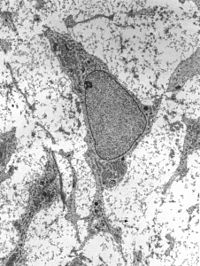
Photo from wikipedia
Background Human adipose-derived stem cells (hASCs) have been shown to have immunoregulatory properties in many studies. However, the mechanisms remain unknown. miRNAs are associated with many cellular processes, including immune… Click to show full abstract
Background Human adipose-derived stem cells (hASCs) have been shown to have immunoregulatory properties in many studies. However, the mechanisms remain unknown. miRNAs are associated with many cellular processes, including immune responses. Thus, we hypothesized that miRNAs act as immunoregulators when hASCs are stimulated by inflammatory environments. Methods A set of cytokines was used to stimulate the hASCs in the cytokine group, while no cytokines were used to stimulate the cells in the normal group. A microarray was used to obtain the miRNA expression profile of hASCs, and RT-PCR was used to validate the miRNAs that were differentially expressed between the two groups. Target genes were predicted using online databases, and KEGG analysis was performed to identify the pathways enriched by the target genes of all the differentially expressed miRNAs. Results Five miRNAs were significantly upregulated, and 2 miRNAs were downregulated in the cytokine group compared with the normal group. We identified several immune-related pathways that are targeted individually or collectively by those miRNAs. Conclusion Inflammatory stimuli changed the miRNA expression profile of hASCs. miRNAs may play a pivotal role in the immune response in hASCs and may be targets through which the immunoregulatory functions of hASCs can be enhanced.
Journal Title: Stem Cells International
Year Published: 2018
Link to full text (if available)
Share on Social Media: Sign Up to like & get
recommendations!